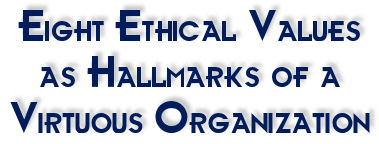Creating and Maintaining an Ethical Corporate Climate
The Woodstock Theological Center
- "The starting point for any organization must be a purpose and a set of goals that reflect the organization's obligation to serve the larger community."
Responsibility of Purpose.
- "A responsible organization, like a responsible individual, will be concerned about the impact of its behavior on others."
Responsibility to Constituencies.
- "Honesty requires the avoidance of deception and careless misrepresentation of information on which others may rely."
Honesty.
- "Reliability implies fidelity to promises and other commitments. Competence and quality are subcategories of reliability."
Reliability.
- "In its most general sense, fairness requires an equitable distribution of burdens and benefits."
Fairness.
- "Employees at all levels, but especially managers and executives should not subject themselves to improper influences or conflicts of interest that may undermine their ability to exercise independent, unbiased judgment. Loyalty in carrying out the duties of a job is an important aspect of integrity."
Integrity.
- "Respect for the individual requires fairness, honesty, reliability, and many of the other virtues already discussed. Beyond that, however, it involves recognition that individuals participate in valuable relationships outside the firm, as well as respect for individual autonomy and privacy."
Respect for the Individual.
- "Respect for property requires recognition of the proprietary rights of others and the exercise of care in handling assets of all types—tangible property, patents and proprietary processes, confidential information, and real estate."
Respect for Property.
download as PDF

